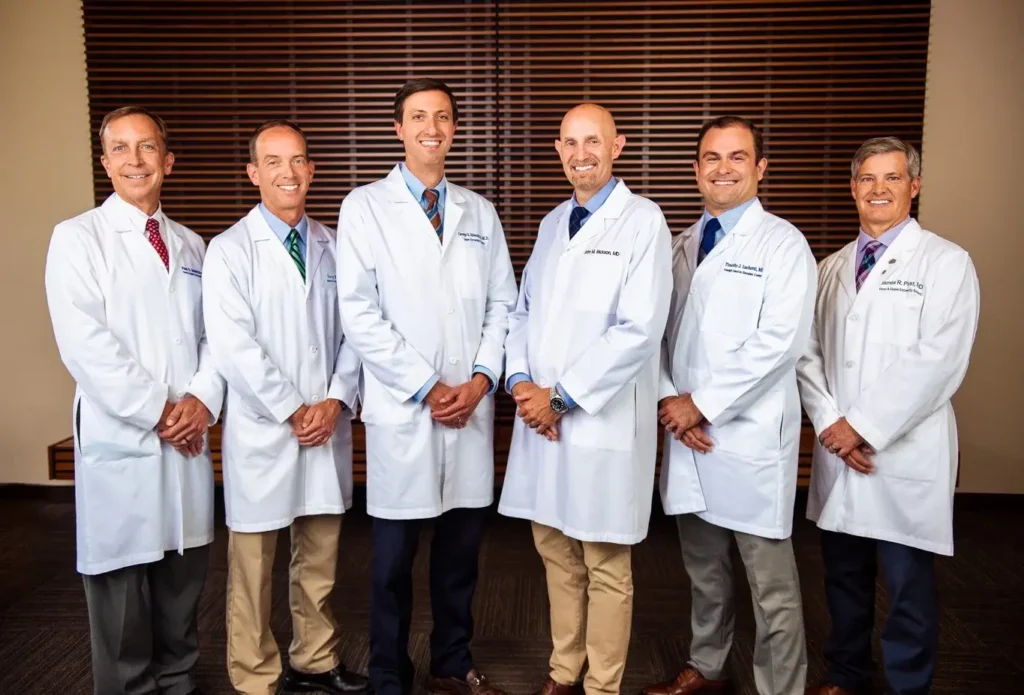Raleigh Hand to Shoulder Center doctors are experts in the diagnosis and treatment of carpal…
Carpal tunnel surgery is one of the most common surgeries performed by hand surgeons in the United States. This article will explain carpal tunnel surgery in detail for patients with carpal tunnel syndrome. Find out if carpal tunnel surgery is right for you with the help of the carpal tunnel experts at Raleigh Hand to Shoulder Center.
If you've been experiencing hand pain, numbness, tingling, or weakness in your hand, you're not alone. Carpal tunnel syndrome is a very common condition that can significantly impact your quality of life and interfere with your sleep at night. Fortunately, our group of compassionate Raleigh orthopedic hand doctors and hand therapists is here to offer you the best available treatment options for carpal tunnel syndrome.
At our orthopedic hand to shoulder practice in Raleigh, we understand the importance of regaining the full function of your hand and wrist. Our surgeons are highly experienced in performing carpal tunnel surgery, a procedure designed to alleviate the compression of the median nerve in the wrist, relieving pain and improving hand function.
What Are the Symptoms of Carpal Tunnel?
The symptoms of carpal tunnel syndrome can vary in severity and may include the following:
- Hand Pain
- Wrist Pain
- Forearm Pain
- Numbness and Tingling in the Hand
- Hand Weakness
- Difficulty with Fine Motor Skills
- Hand and Wrist Swelling
- Worsening Symptoms at Night
- Radiating Pain up the Arm
Carpal tunnel symptoms may progress gradually over time. Initially symptoms may come and go intermittently. Some individuals may experience only mild discomfort, while others may have more severe symptoms that significantly impact their daily lives and their sleep at night. Over time the symptoms may become constant and more bothersome. If you suspect that you may have carpal tunnel syndrome, it is recommended that you seek medical evaluation from a skilled practitioner.

Do I Need Carpal Tunnel Surgery?
When non-surgical treatment has not alleviated the carpal tunnel symptoms of hand numbness, tingling, and pins and needles pain, carpal tunnel surgery should be considered. If you cannot sleep at night due to hand numbness and tingling or if you cannot complete daily tasks such as driving, cooking, or typing without the hand going numb, surgery should be considered. Patients with mild symptoms usually do not require surgery.
If the hand stretches, wrist splints, and cortisone injections are no longer helping, carpal tunnel surgery should be considered. Also, carpal tunnel surgery is recommended to prevent further nerve damage if there are signs of existing nerve damage, such as thumb muscle loss or constant numbness in the thumb, index, and middle fingers. Longstanding or severe carpal tunnel syndrome can result in nerve damage.
Ultimately, the decision to undergo carpal tunnel surgery should be a collaborative one between you and your doctor. Your preferences, goals, and willingness to undergo the procedure should be taken into account.
Techniques Used for Carpal Tunnel Surgery
Open and endoscopic carpal tunnel releases are two excellent, common surgery options. Carpal tunnel release surgery is nowadays much less invasive than it used to be in the past. This has allowed quicker patient recovery with less pain and less scar tissue formation. Additionally, splints or casts are not required postoperatively and the procedure does not need to take place in a hospital. The recommended procedure for you will be discussed by your doctor.
Open Carpal Tunnel Surgery
In this traditional approach, an incision is made in the palm of the hand near the base of the wrist. The surgeon then cuts the transverse carpal ligament—the band of tissue that forms the roof of the carpal tunnel—to release pressure on the median nerve. Surgeons often use a smaller incision these days, called a mini-open carpal tunnel release. This procedure can be performed with the patient awake using local anesthesia numbing medicine.
Endoscopic Carpal Tunnel Surgery
This minimally invasive technique involves the use of a narrow camera (endoscope) to guide the surgeon during surgery. A small incision is made in the wrist, and the transverse carpal ligament is cut using specialized instruments. Endoscopic carpal tunnel release surgery may result in smaller scars and a quicker recovery compared to the open carpal tunnel surgery. However, open and endoscopic carpal tunnel surgery have very similar long term results.
What are the types of Carpal Tunnel Surgery available at Raleigh Hand?
- Less invasive carpal tunnel release
- Endoscopic carpal tunnel release
- Mini-open carpal tunnel release
- Awake carpal tunnel release
- Revision carpal tunnel release
What is the Success Rate of Carpal Tunnel Surgery?
Over 90% of patients are pleased with the results of carpal tunnel surgery and would recommend this surgery to their family and friends. Most patients have significantly less hand pain and numbness after carpal tunnel surgery and can sleep through the night without tingling in their hands. Many patients are so pleased with the relief of their carpal tunnel symptoms that they wish that they had carpal tunnel surgery years ago!
Please make an appointment with the Raleigh Hand to Shoulder Center doctors to learn more about your treatment options for your carpal tunnel syndrome. Get relief from your carpal tunnel syndrome and get back to the life you enjoy. Raleigh Hand to Shoulder Center doctors also treat other causes of hand pain including arthritis, tendonitis, ganglion cysts, ligament injuries, tendon injuries, among others.



